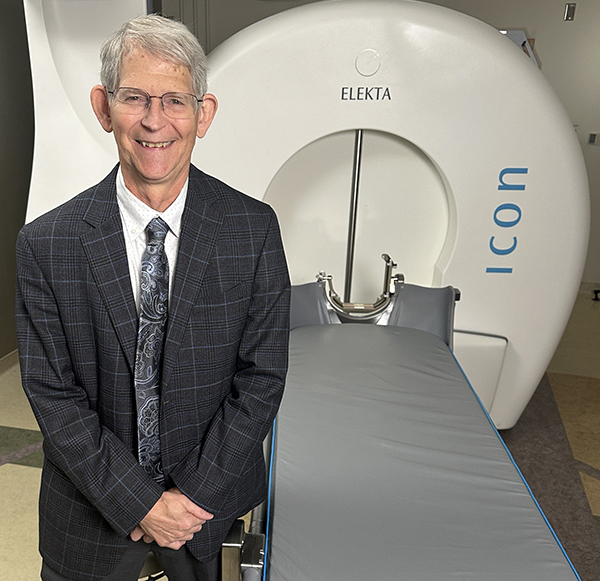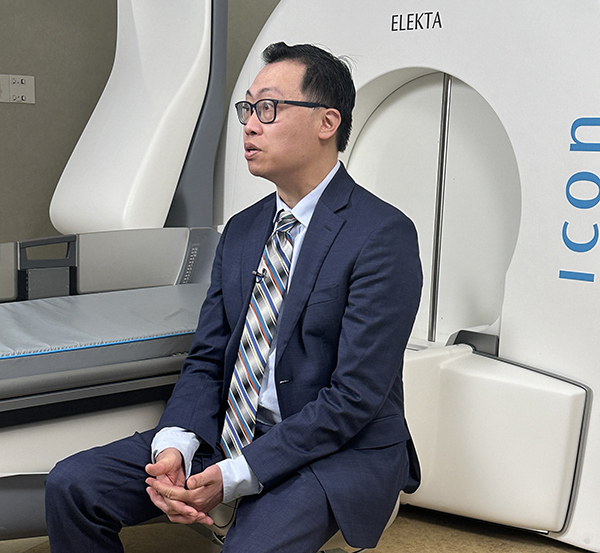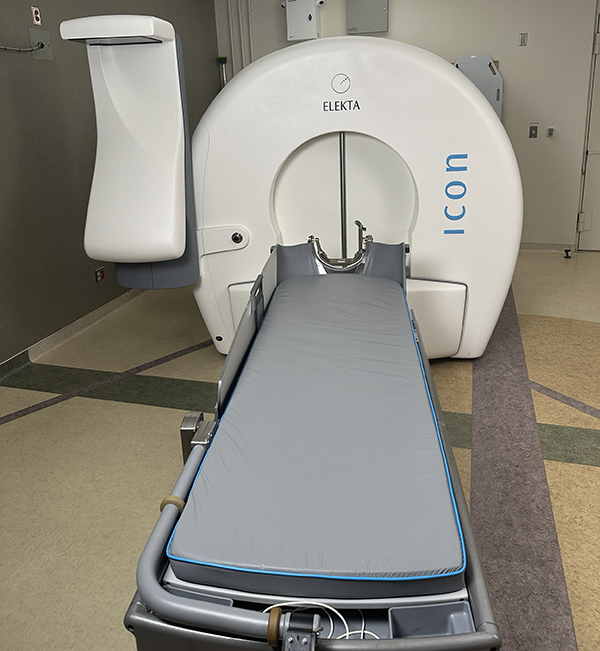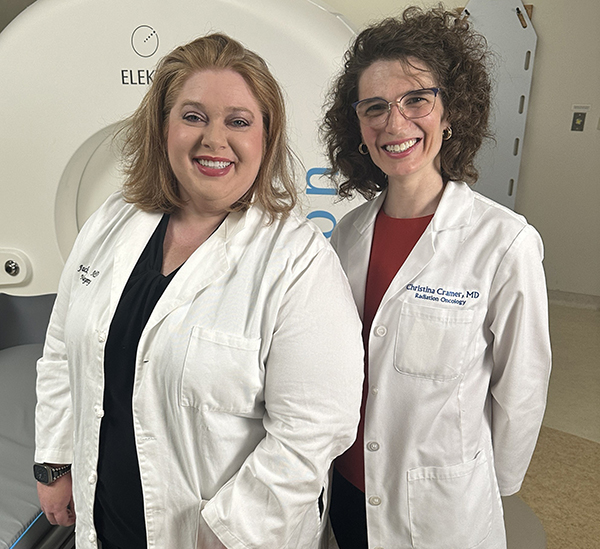
About thirty years ago, two radiation oncology specialists came to Atrium Health Wake Forest Baptist to initiate the department of radiation oncology. These two doctors, Dr. Ed Shaw, radiation oncologist and inaugural chair of the new department, and Dr. Dan Bourland, medical physicist and head of radiation oncology physics, brought a request with them: The hospital needed a Gamma Knife machine. It was a big request in every way, even literally. This massive machine, which directs focused beams of radiation into the brain, weighed 20 tons. The technology was also so new and expensive that most states in the country lacked a single hospital with a Gamma Knife machine. Still, Shaw, Bourland and their neurosurgery colleagues engaged in a few years of “science and diplomatic diplomacy” to convince the State of North Carolina and the hospital administration that Atrium Health Wake Forest Baptist needed Gamma Knife.

Radiation oncology and neurosurgery successfully made their case, and Atrium Health Wake Forest Baptist now celebrates its 25th anniversary of providing Gamma Knife radiosurgery to patients. It’s become one of the top hospitals in the country for the procedure, in terms of the number of patients who receive the treatment and the amount of research that its doctors publish. Now, people from throughout the region travel here for Gamma Knife treatment of brain tumors (both benign and metastatic) and trigeminal neuralgia, a neurological condition that causes facial pain.
“It took a large amount of effort and vision to recognize that Gamma Knife was the way to go,” said Dr. Michael Chan, interim chair of radiation oncology at Atrium Health Wake Forest Baptist. “And now, 25 years later, it’s played out very well. But it took someone to say, ‘We need to do this.’”
What is Gamma Knife Radiosurgery?

The most important aspect of Gamma Knife radiosurgery is its precision. When you think of Gamma Knife radiosurgery, think of a flashlight. The closer a flashlight gets to its subject, the more focused and direct the light becomes. Gamma Knife radiosurgery directs such a precise, focused beam of radiation onto its target - usually, a brain tumor - that it spares the healthy tissue around it. This is crucial for brain radiation, considering the many vital areas responsible for cognitive skills and motor function, which includes everything from the body’s reflexes and walking to writing and eating.
In addition to its accuracy, Gamma Knife radiosurgery offers another big advantage: convenience. Without this technology, many of these patients would require brain surgery and, with it, a hospital stay and long recovery. Gamma Knife, however, is an outpatient procedure.
“There's nothing that I like better than to walk into a room and to tell a patient they actually don't need surgery,” said Dr. Jaclyn White, a neurosurgeon at Atrium Health Wake Forest Baptist and a member of the Gamma Knife team. “I can tell them that we're able to treat their disease with a minimally invasive approach that has excellent success rates and involves a one-day outpatient procedure.”
When Gamma Knife radiosurgery first came to Atrium Health Wake Forest Baptist, many of the machine’s operations, such as directing the beam of radiation or positioning the patient, were manual. Dr. Bourland jokes that the team was like a NASCAR pit crew: They’d come in to adjust the position of the patient and the machine’s settings to complete each successive step of treatment. Since then, the technology has advanced, becoming more automated, digitized and even more accurate. In fact, computing systems can analyze digital images to determine the precise location [to be] targeted by the radiation beam, calculate the exact dosage needed and then automatically adjust a patient’s position via a mobile surface - ensuring the highest level of accuracy.
“Automation and imaging have greatly contributed to the efficiency of the Gamma unit,” Dr. Bourland said. “It's both a very simple and elegant technology to treat targets in the brain.”
More Than Technology
While a lot of buzz about Gamma Knife radiation is about the machine itself, the program at Atrium Health Wake Forest Baptist showed how the human element is just as important. A world-class group of specialists was assembled to form the Gamma Knife team: neurosurgeons, radiation oncologists, physicists and specialized coordinators who guide patients through the process. That collaborative approach continues today as the team works together on each patient’s treatment plan, giving patients access to the expertise of multi-disciplinary specialists.
“We've been working together for a long time, and we share an understanding of how we like to do things, that it’s all about what's best for the patient,” said Dr. Chan. “I take a lot of pride in our team and how we’re all completely focused on the patient. This deep expertise coupled with decades of experience, is what brings patients - even those with some of the most complex or rare conditions - to our program.”
Writing the Next Chapter of Gamma Knife

Atrium Health Wake Forest Baptist hasn’t only played an important part in the history of Gamma Knife, but it’s playing a crucial role in its future as well. Because it’s among one of the top ten hospitals in the U.S. in terms of patient volume - more than 550 patients come for Gamma Knife each year - it collects strong data that guides studies from around the country. Atrium Health Wake Forest Baptist is also the top U.S. programs in terms of publications for Gamma Knife research.
For example, Atrium Health Wake Forest Baptist physicians and researchers are conducting clinical trials to test how to incorporate Gamma Knife with immunotherapy, another cancer break-through treatment, to improve outcomes and minimize side effects.
“As cancer patients are living longer and becoming long-term survivors, it’s very important to their quality of life,” says Dr. Christina Cramer, associate professor of radiation oncology at Atrium Health Wake Forest Baptist and a member of the Gamma Knife team. “As a part of their care team, it's wonderful to see that they can live longer - and live better - with fewer side effects by using the Gamma Knife and focused radiotherapy.”
It’s more than trials and publications that show the power of Gamma Knife radiosurgery. It’s 25 years of patient stories. By now, almost everyone in the Winston-Salem area seems to know someone who’s been helped by this treatment.
“While it’s wonderful to honor this milestone and everything it represents, it’s even more meaningful to celebrate the everyday milestones in our patients’ lives,” Dr. Chan says. “For example, I had a patient who would always tell me, 'You have to help me out because I have a five-year-old who needs me.’ And now, that five-year-old has graduated from high school. Celebrating milestones like that is why our 25-year legacy means so much - it’s the motivation behind what we do each and every day."
